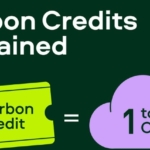
Introduction
The concept of carbon credit trading is gaining global attention as a mechanism to combat climate change and poverty. For young entrepreneurs in Ghana, this presents a unique opportunity to engage in an emerging market. This article aims to simplify the concept of carbon credit trading and underscore its potential benefits, particularly for those aspiring to serve as intermediaries between Ghana and international entities.
What are Carbon Credits?
Carbon credits are permits that authorize the emission of a specific amount of carbon dioxide or other greenhouse gases. One credit equals one tonne of CO2. These credits are integral to international efforts to mitigate emissions and combat climate change.
How Does Carbon Credit Trading Work?
Carbon trading functions under a cap-and-trade system. Governments or international organizations set emission caps and allocate or sell credits to entities. Companies reducing their emissions can sell their excess credits. This market-based approach incentivizes reducing emissions, turning them into a financial asset.
The Role of Intermediaries
In the carbon credit market, intermediaries link sellers and buyers of carbon credits. In Ghana, young entrepreneurs can act as brokers, facilitating deals between local projects generating carbon credits and international buyers. This role demands an understanding of both local and international emission standards and markets.
Opportunities for Ghanaian Entrepreneurs
Ghana, known for its diverse ecosystems, is ripe for carbon credit generation. Entrepreneurs can assist in identifying projects, like reforestation or renewable energy initiatives that can earn credits. They can also play a crucial role in navigating certification processes and marketing these credits on a global scale.
Integration with the Ghanaian Cocoa Industry
The cocoa sector in Ghana provides a prime example of how carbon credit trading can be applied. Cocoa farms, through practices like agroforestry, can capture significant amounts of carbon. Entrepreneurs can aid farmers in quantifying this sequestration and trading the resulting credits.
Benefits to Entrepreneurs
Financial Rewards: Successful trading can be lucrative.
Environmental Impact: This venture contributes to combating climate change.
Networking Opportunities: It opens doors to international business and organizational networks.
Skill Enhancement: Entrepreneurs gain skills in finance, international law, and environmental science.
Challenges and Considerations
Market Fluctuations: Entrepreneurs must adapt to the volatile carbon credit market.
Regulatory Compliance: It’s essential to comply with international and local laws.
Carbon credit trading presents an unparalleled opportunity for young Ghanaian entrepreneurs to start profitable ventures while contributing to environmental sustainability. With the right knowledge, networks, and commitment, they can become pivotal players in this global initiative, particularly by integrating traditional industries like cocoa farming into this innovative market.
Good luck.



